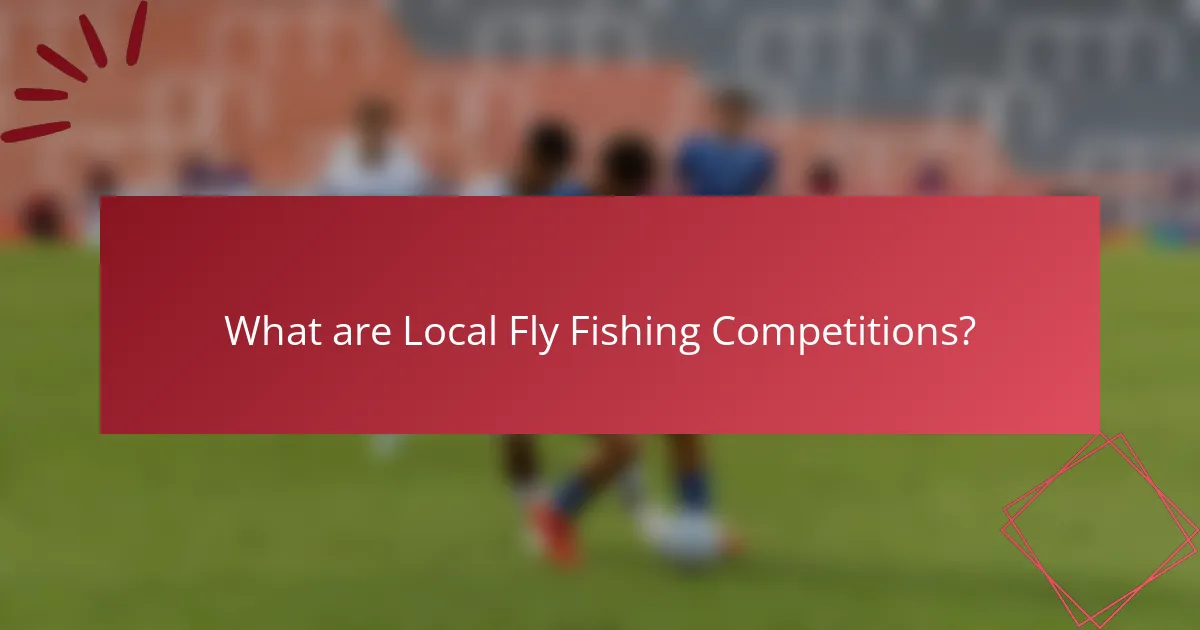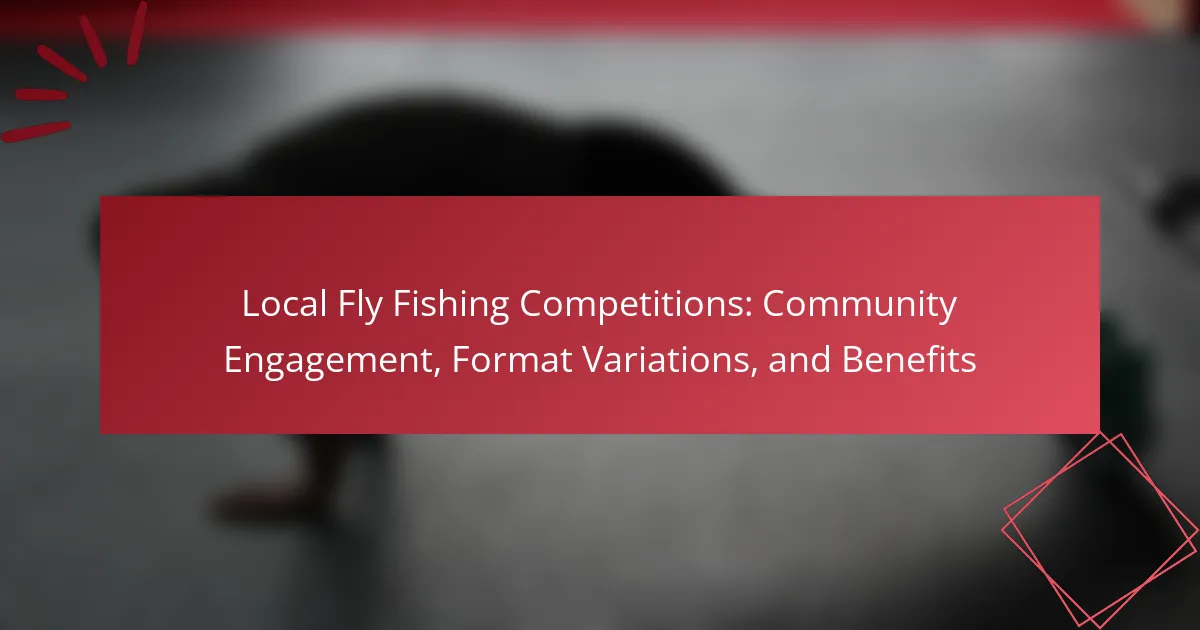Local fly fishing competitions are organized events where anglers compete to catch fish using specific fly fishing techniques in various aquatic environments such as rivers, lakes, or streams. Participants are evaluated based on criteria like the number, size, or species of fish caught, promoting community engagement among fishing enthusiasts. These competitions foster camaraderie, skill sharing, and often emphasize conservation efforts and awareness of aquatic ecosystems. The formats of these events can vary, including catch-and-release rules or time constraints, making them accessible to anglers of all skill levels, from beginners to experts.

What are Local Fly Fishing Competitions?
Local fly fishing competitions are organized events where anglers compete to catch fish using fly fishing techniques. These competitions often take place in local rivers, lakes, or streams. Participants are typically judged based on the number, size, or species of fish caught. Local competitions encourage community engagement among fishing enthusiasts. They often foster camaraderie and skill sharing among participants. Many local competitions also promote conservation efforts and awareness of aquatic ecosystems. Events can vary in format, including catch-and-release or specific time limits for fishing. These competitions can attract participants of all skill levels, from beginners to experts.
How do Local Fly Fishing Competitions foster community engagement?
Local fly fishing competitions foster community engagement by bringing together enthusiasts to share their passion. These events create opportunities for social interaction among participants and spectators. They encourage local businesses to support the competitions, boosting the economy. Community members often volunteer to organize and run these events, enhancing local involvement. Competitions also promote environmental awareness through education on sustainable fishing practices. Furthermore, they provide a platform for families to bond over a shared activity. According to the American Fly Fishing Trade Association, such events can increase local tourism and community spirit. These factors collectively strengthen community ties and create a sense of belonging among residents.
What roles do local organizations play in these competitions?
Local organizations play crucial roles in local fly fishing competitions. They often serve as sponsors, providing funding and resources. These organizations help organize the events, ensuring smooth operations. They also promote community engagement by encouraging participation from local anglers. Additionally, local organizations can offer training and workshops to enhance skills. They may also facilitate conservation efforts to protect local waterways. Their involvement fosters a sense of community and camaraderie among participants. Overall, local organizations are essential for the success and sustainability of these competitions.
How do participants contribute to community spirit?
Participants contribute to community spirit by fostering connections among individuals. They engage in collaborative activities that promote teamwork and camaraderie. Through shared experiences, participants create lasting relationships. These interactions help build a sense of belonging within the community. Events like local fly fishing competitions encourage friendly competition and mutual support. Participants often volunteer, enhancing community involvement and pride. Their contributions can lead to increased local awareness and appreciation for natural resources. Ultimately, these activities strengthen the overall community fabric.
What are the different formats of Local Fly Fishing Competitions?
Local fly fishing competitions can take several formats. Common formats include catch-and-release, where participants must return fish to the water. Another format is the largest fish competition, which awards the biggest catch. Time-limited events require anglers to catch as many fish as possible within a set duration. Some competitions feature specific species, focusing on targeted fish types. Other formats may involve teams competing together. Additionally, there are youth and novice categories to encourage new participants. These formats enhance community engagement and promote the sport.
What are the common types of competition formats?
Common types of competition formats include individual, team, and catch-and-release formats. Individual formats focus on each participant competing alone. Team formats involve groups working together to achieve a common goal. Catch-and-release formats emphasize conservation by requiring participants to release fish after catching them. These formats promote fair competition and environmental responsibility. Each format serves different purposes and appeals to various angler preferences.
How do variations in rules affect competition outcomes?
Variations in rules significantly affect competition outcomes by influencing participant strategies and performance. Different rule sets can alter the level of difficulty in competitions. For instance, stricter catch-and-release rules may lead to more cautious fishing techniques. Conversely, relaxed rules might encourage more aggressive fishing styles.
Additionally, variations can impact fairness and competitiveness. Rules that favor certain fishing methods can disadvantage participants using alternative techniques. A study by the American Fly Fishing Trade Association found that standardized rules enhance competition fairness, leading to more predictable outcomes.
Ultimately, the specific rules in place shape how competitors approach the event and the overall results of the competition.
What benefits do Local Fly Fishing Competitions provide?
Local fly fishing competitions provide numerous benefits to participants and the community. They foster community engagement by bringing together local anglers and promoting camaraderie. Competitions often enhance local economies through increased tourism and spending in related businesses. Participants gain opportunities to improve their fishing skills and learn from experienced anglers. These events can also raise awareness about conservation efforts and the importance of preserving aquatic ecosystems. Additionally, they often support local charities, contributing to social causes. Overall, local fly fishing competitions create a sense of belonging and promote sustainable fishing practices.
How do these competitions promote environmental awareness?
Local fly fishing competitions promote environmental awareness by encouraging participants to engage with natural ecosystems. These competitions often emphasize sustainable fishing practices. They educate anglers on the importance of preserving aquatic habitats. Many events include workshops on conservation techniques. Participants learn about native species and their roles in the ecosystem. Competitions may partner with environmental organizations to raise awareness. They often feature clean-up initiatives to protect local waterways. Statistics show that such events can increase community involvement in conservation efforts.
What economic benefits arise from hosting these events?
Hosting local fly fishing competitions generates significant economic benefits for communities. These events attract participants and spectators, increasing local tourism. Local businesses, such as hotels, restaurants, and shops, see a boost in sales during the event. A study by the American Sportfishing Association found that fishing tournaments can generate millions in economic impact. In 2019, a major fishing tournament in Texas brought in over $5 million in revenue. Additionally, these competitions create jobs related to event organization and support services. Local governments may also benefit from increased tax revenue from the influx of visitors. Overall, hosting these events can lead to substantial economic growth for the community.
How can participants get involved in Local Fly Fishing Competitions?
Participants can get involved in local fly fishing competitions by registering through local fishing clubs or organizations. Many competitions are advertised on social media and community boards. Interested individuals should check local fishing regulations and competition rules. Participants may need to pay an entry fee, which varies by event. They can also attend informational meetings or workshops hosted by local clubs. Networking with experienced anglers can provide insights and tips for preparation. Some competitions may require specific gear or licenses, so it’s essential to review requirements beforehand. Engaging with local fishing communities can enhance the overall experience and provide updates on upcoming events.
What are the prerequisites for entering a competition?
Participants must typically be registered members of the organizing fishing club or association. Many competitions require anglers to possess a valid fishing license. Some competitions may have age restrictions, requiring participants to be a certain age. Certain events may also require specific gear or equipment to be used. Competitors might need to pay an entry fee to participate. Additionally, knowledge of competition rules and regulations is often mandatory. Some events may require prior experience or participation in qualifying rounds. These prerequisites ensure a fair and organized competition environment.
How can beginners prepare for their first competition?
Beginners can prepare for their first competition by practicing regularly. Consistent practice helps improve casting techniques and overall skill. They should also learn about the specific rules of the competition. Understanding the regulations ensures compliance and enhances performance. Additionally, beginners should familiarize themselves with the competition venue. Knowing the water conditions and fish species can provide a strategic advantage. They can also seek advice from experienced competitors. Mentorship can offer valuable insights and tips. Lastly, beginners should ensure they have the right gear. Proper equipment is crucial for success in fly fishing competitions.
What tips can enhance the experience of Local Fly Fishing Competitions?
To enhance the experience of local fly fishing competitions, participants should focus on preparation, community involvement, and equipment optimization. First, participants should familiarize themselves with the competition rules and regulations. Understanding these guidelines ensures compliance and maximizes performance. Second, engaging with the local fishing community can provide valuable insights and camaraderie. Networking with fellow anglers can lead to shared tips and strategies. Third, participants should invest time in practicing casting techniques and fly selection. Consistent practice improves skill levels and increases chances of success. Fourth, selecting the right gear is crucial. Quality rods, reels, and flies tailored to local conditions can significantly impact results. Lastly, staying updated on weather conditions and water levels is essential. This information helps participants adapt their strategies effectively.
Local fly fishing competitions are organized events where anglers compete using fly fishing techniques, fostering community engagement and promoting environmental awareness. These competitions vary in format, including catch-and-release and time-limited events, and attract participants of all skill levels. Local organizations play a vital role in facilitating these events, enhancing community spirit and economic benefits through increased tourism and local business support. Participants can improve their skills, engage with the community, and contribute to conservation efforts, making these competitions beneficial for both individuals and the broader community.
